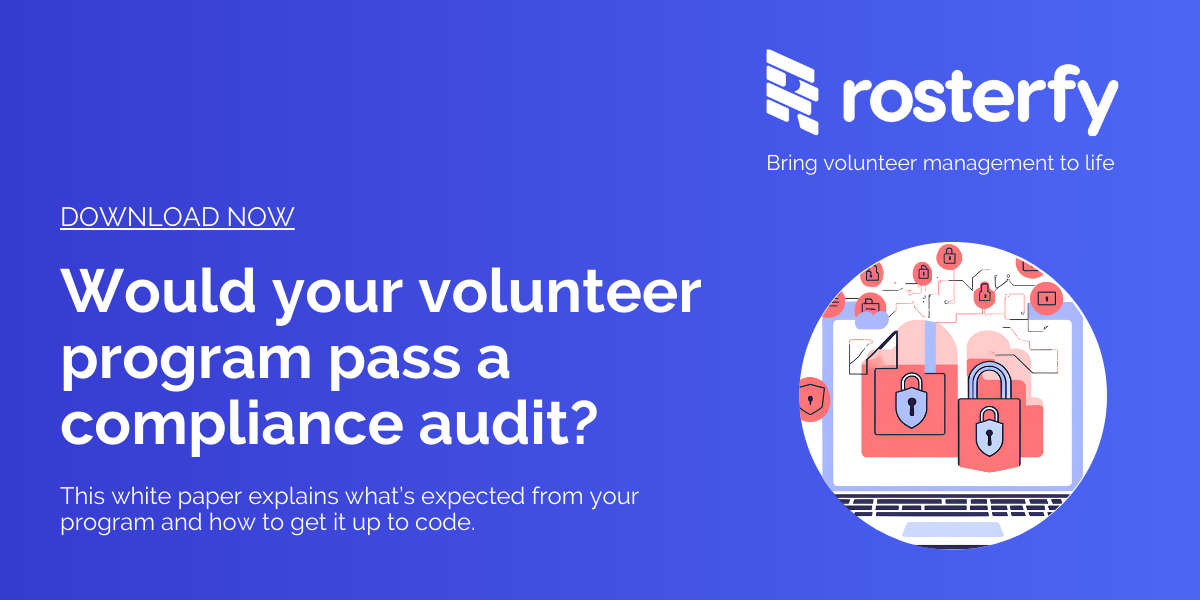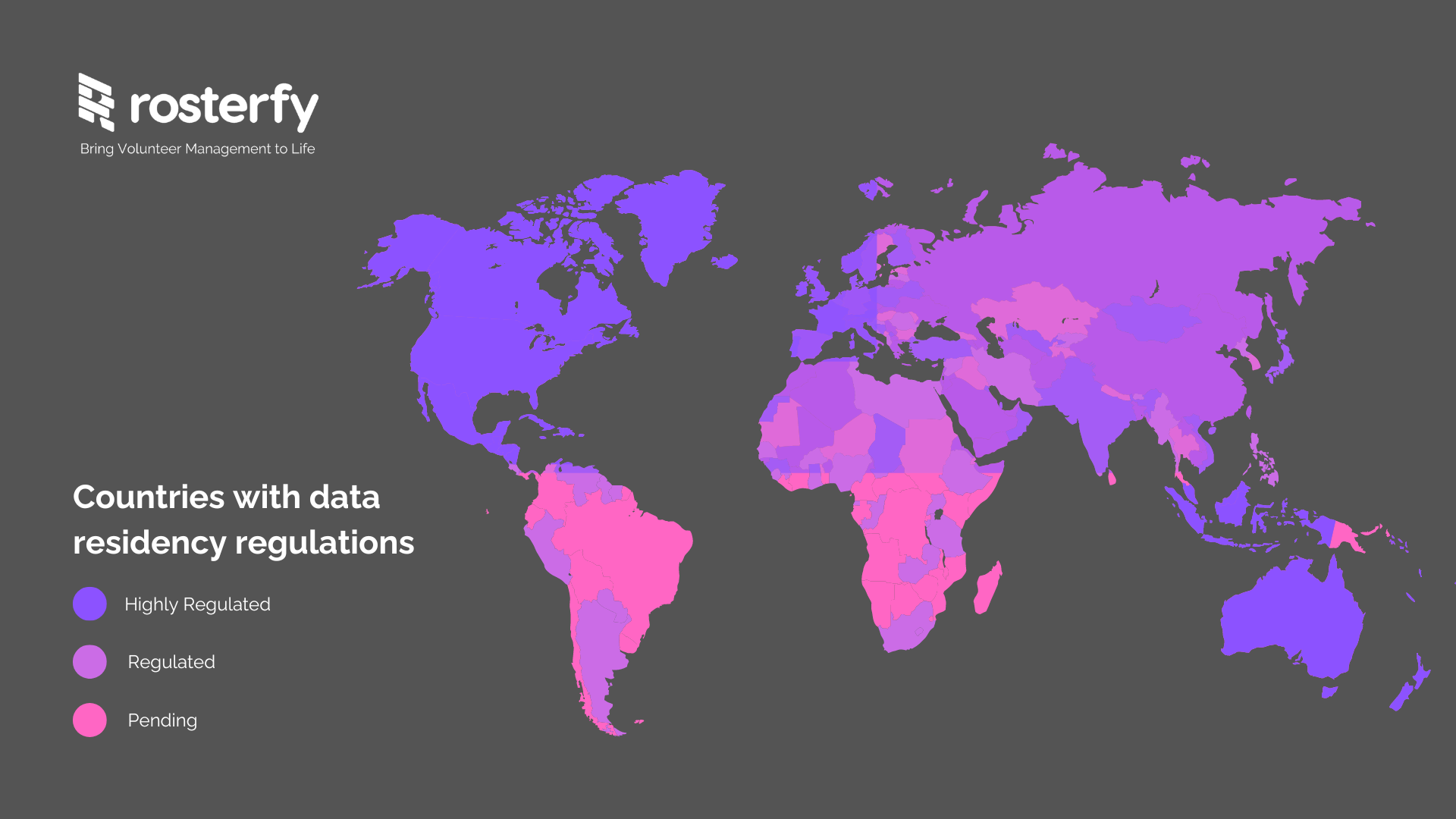In this comprehensive guide, we aim to provide a practical approach to training volunteers on data security. The aim is to empower volunteers with advice to safeguard their personal data and to protect your organisation from the potential reputational damage that can result from data security breaches.
Safeguarding sensitive information is paramount for any organisation, especially those that rely on volunteers. Volunteer programs handle a significant amount of personal data, from contact details to sensitive background checks. Ensuring that this data is secure is crucial not only to protect volunteers but also to maintain the organisation's reputation.
Here's a comprehensive guide on how to effectively train your volunteers on data security
Educating the Importance of Data Security
Volunteers may not be aware of the risks associated with data breaches and the importance of maintaining data security. Begin by explaining the potential consequences of data breaches, including identity theft, financial loss, and damage to the organisation’s credibility.
Data security-savvy volunteers who are much more ‘in the know’ when it comes to their data security will look to you to reassure them that you have taken every measure to ensure their data is held securely.
Key Points to Cover:
- The types of sensitive information they might encounter.
- Real-world examples of data breaches in volunteer organisations.
- The potential impact on individuals and the organisation.
How to communicate these key points
Use every tool at your disposal to communicate the importance of data protection and the actions you’ve taken to protect them.
- Volunteer Portals: If you’re using a Volunteer Management Software platform such as Rosterfy, you can use your volunteer opportunity portal to explain your policy and share advice. This shows them even before they have completed their application process that you take their data security very seriously.
- Email Communication: Rosterfy allows you to schedule email communications to your volunteers. Building a sequence of emails throughout their application and onboarding process offers you a chance to highlight how you aim to protect their data. You can also use these emails to share tips and advice around safeguarding their data.

Developing a Data Security Policy
A well-defined data security policy sets the foundation for protecting sensitive information. This policy should outline the responsibilities of volunteers and the procedures for handling data.
Elements to Include:
- Data handling procedures (collection, storage, and disposal).
- Access control measures.
- Guidelines for using personal devices and secure connections.
- Reporting protocols for data breaches or suspicious activities.
Transparency creates trust
Centralising this information on your website provides a single dependable source. This simplifies the process of directing volunteers and internal teams to the same, reliable information.
An example of this is Rosterfy’s own Trust Center.
We created a helpful resource page on our website to meet the needs of our customers or organisations interested in using Rosterfy to help them manage their volunteers. We found we were asked often for downloadable resources or details on our data security policies (only further highlighting how important this subject is to the modern day volunteer program) so we created our Trust Center.
Obviously, this is likely to be far more detailed than is required by volunteers but if you were working with government programs or corporate partners that require more robust security measures to be met it assures them data security is covered.

Implementing Regular Training Sessions
Conduct regular training sessions to keep volunteers informed and engaged. These sessions can be in-person or virtual, and should include interactive elements like quizzes, discussions, and real-life scenarios.
The most successful training sessions built into volunteer programs are scalable and fun. It’s important to keep the tone engaging. Let’s be honest, the topic of data security can be a little dry so try to make it relatable and connected to your message.
Topics to Cover:
- Basics of data security (password management, recognising phishing attempts).
- Specific procedures for your organisation (how to access and store data securely).
- Updates on new threats and security practices.
Making security training engaging
Try to keep it fun and interactive. Many Rosterfy customers have built their data security training into their volunteer onboarding process. They use our online training tools to create multiple choice quizzes and videos to help keep the content engaging.
A great example of this is The Literacy Pirates. They are a UK based children’s charity who lean into their pirate theme throughout their training and screening to create a strong identity with their volunteer program.
By modifying the sequence of providing program details and scheduling training for new volunteers, the organisation experienced a substantial increase in applicant conversion rates, exceeding 30%, compared to the program's previous performance.
You can read more about their story here
Using Technology to Enhance Security
Leverage technology to support your data security efforts. Use secure volunteer management systems and encrypted communication tools to protect sensitive information.
Recommendations:
- Secure volunteer management software with role-based access controls.
- Encrypted email and messaging platforms.
- Use a cloud-based volunteer management software platform
Where is your data hosted or stored? If your volunteer program works with local governments, cities or with partners that require certain localised data management regulations be upheld, that's an important question.
Many organisations are realising their current provider can’t meet data residency requirements and are moving to Rosterfy because we often meet this requirement. Our platform is used in over 26 countries worldwide, translated into multiple languages and trusted by cities and local government volunteer programs.

Creating a Culture of Security
Encourage a culture where data security is a priority. This involves continuous education, open communication, and leading by example.
Strategies for your team:
- Regularly update volunteers on security practices and news.
- Encourage them to ask questions and report any concerns.
- Recognise and reward good security practices among volunteers.
Threats to data security are forever evolving. People looking to exploit weaknesses in your data security measures are constantly adjusting their strategy so communicating that your volunteer’s data security is of high importance is beneficial.
You don’t have to tell them about every update you make to your policy or strategy but it’s certainly advisable to communicate significant updates or quarterly mentions in newsletters and emails.
Conducting Regular Audits and Assessments
Regularly assess your data security measures to ensure they are effective and up-to-date. This includes conducting audits, reviewing policies, and gathering feedback from volunteers.
Steps to Take
- Schedule periodic security audits.
- Review and update data security policies annually.
- Use feedback from volunteers to improve training and procedures.
As mentioned in the previous section, data security never sleeps. You need to be vigilant and a lot can be learned from the mistakes made by volunteers or your team so encourage communication. The golden rule to encourage is when there’s a slip up, communicate clearly and early.
Providing Resources and Support
Equip your volunteers with the resources they need to stay informed about data security. This can include access to online courses, newsletters, and a dedicated support team.
Resources to Offer
- Online courses on data security fundamentals.
- Regular newsletters with tips and updates.
- A support team or helpdesk for security-related questions.
If you’re fortunate enough to have a centralised portal for new opportunities, news and updates to your volunteers then use this space to provide resources and support.
Conclusion
Training volunteers on data security is a continuous process that requires commitment and vigilance. By implementing comprehensive training programs, leveraging technology, and fostering a culture of security, organisations can protect sensitive information and maintain the trust of their volunteers.
Remember, data security is everyone’s responsibility, and with the right approach, you can ensure that your volunteer program remains secure and effective.
You can read more about data security for volunteer program in this white paper dedicated to keep your program secure: Download the white paper
About Rosterfy
Rosterfy is used by nonprofits, charities, sporting federations, local governments, and more to better manage their volunteer programs by improving how they can recruit, screen, train, and retain volunteers.
Our market leading technology helps you create an engaging experience throughout the whole lifecycle of your volunteer journey.
Book a call today.